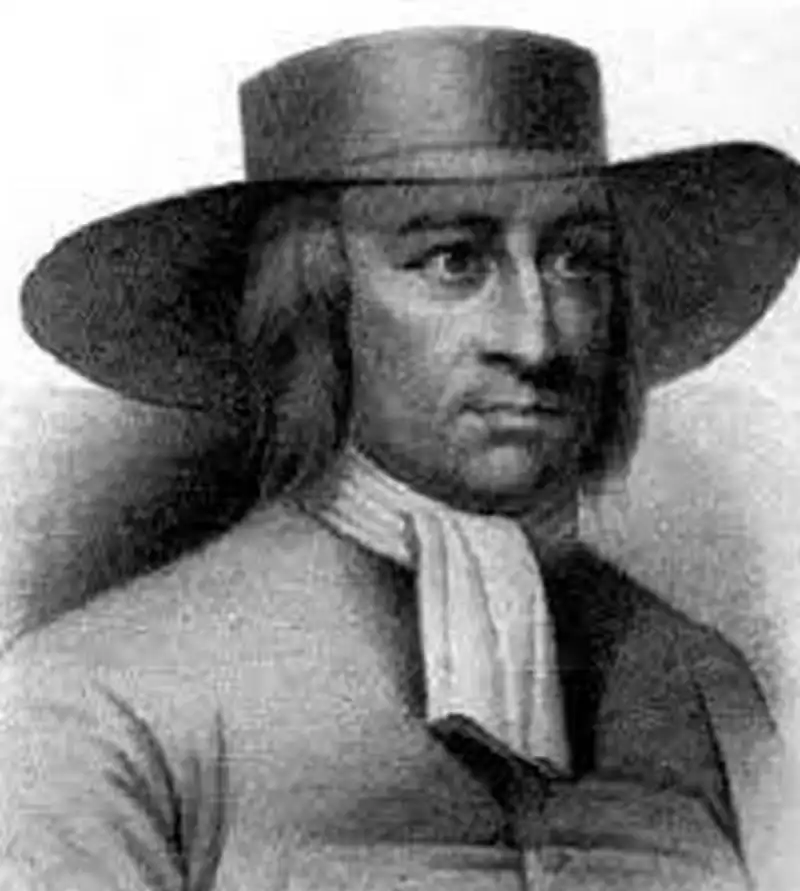
George Fox (1624-1691) was an English preacher and founder of the Religious Society of Friends, more commonly known as Quakers. Born in Fenny Drayton, England, Fox had a religious upbringing but became dissatisfied with the teachings of the Anglican Church. In his youth he traveled around England as an itinerant preacher, promoting his vision of an inner light that guided righteous living. Despite persecution, Fox gathered many followers who shared his belief in equality, pacifism and social reform.
Visions Lead George Fox to a New Understanding
In the 1640s, George Fox left home in search of religious truth. He rejected the teachings of priests and academics, believing instead in an “inner light” from God that spoke directly to each person. While imprisoned for blasphemy in 1651, Fox had a life-changing vision of a great people to be gathered. This convinced him that he had been called to preach a radical new message – that salvation comes not through ceremony or doctrine, but through each believer’s personal relationship with the Divine.
Fox began preaching across England, declaring that all people had access to the light of Christ within. He urged his listeners to turn away from empty religious ritual and live lives of virtue and compassion. Many were drawn to his message of spiritual democracy. Though Fox and his followers, dubbed “Quakers”, were persecuted for their unconventional views, the movement continued to grow. By 1660 there were around 50,000 Quakers in England and Wales.
Fox traveled extensively throughout Britain and Ireland, as well as North America, spreading his uncompromising message. He was instrumental in organizing the Religious Society of Friends, based on principles of spiritual equality, social justice and nonviolence. The Quakers rejected hierarchical leadership and emphasized living virtuously over adhering to doctrine. Their refusal to swear oaths or participate in warfare brought them into conflict with authorities. However, despite fines and imprisonments, the Quaker movement continued expanding in Britain’s North American colonies and beyond.
Fox’s Teachings Lead to the Formation of the Quakers
George Fox taught that God’s light exists within every person, and this “inner light” provides each one with the ability to have a direct relationship with God. He emphasized personal spiritual experience over empty religious rituals or man-made doctrines.
Fox encouraged his followers to live with integrity, to reject violence, and to actively work for social justice. He advocated for women’s rights, fair treatment of Native Americans, and an end to slavery – radical views for 17th century England.
Fox established meetings for worship based on silent waiting, with individuals speaking up if they felt inspired by the inner light. There was no formal program, priesthood or sacraments. This egalitarian approach appealed to many, but also met with hostility from religious authorities.
In 1668 Fox married Margaret Fell, a fellow Quaker and wealthy widow who provided critical financial support for the young religious movement. That same year, he helped organize the Quakers into a national organization called the Friends General Meeting, establishing networks of meetings at the local and regional level.
By the time of George Fox’s death in 1691, Quakerism had become a thriving religious community not just in Britain but also in North America. Fox’s followers numbered over 50,000 at the end of his life. Although he was imprisoned multiple times for his beliefs, Fox never wavered in spreading his message of spiritual democracy. He left a legacy of moral courage and religious tolerance that remains an inspiration today.
Conclusion
George Fox followed his inner light to found a radically new kind of Christian fellowship. The Quakers started as a small gathering of Fox’s followers in the 1650s but grew into an influential religious group thanks to his tireless preaching across Britain. Fox’s belief in equality, social justice and nonviolence took root and flourished after his death, leaving a lasting impact on Quaker thought and practice. Though controversial in his time, Fox is remembered today as a champion of religious freedom and progressive ideals.
References
Ingle, H. Larry. First Among Friends: George Fox and the Creation of Quakerism. Oxford University Press, 1994.
Punshon, John. Portrait in Grey: A Short History of the Quakers. Quaker Books, 2006.
Nickalls, John L. The Journal of George Fox. Cambridge University Press, 1952.
Barbour, Hugh. The Quakers in Puritan England. Yale University Press, 1964.
